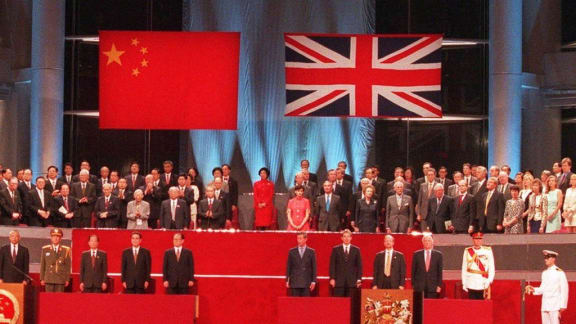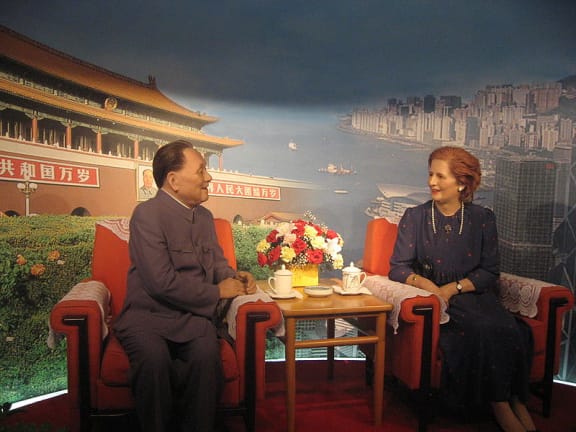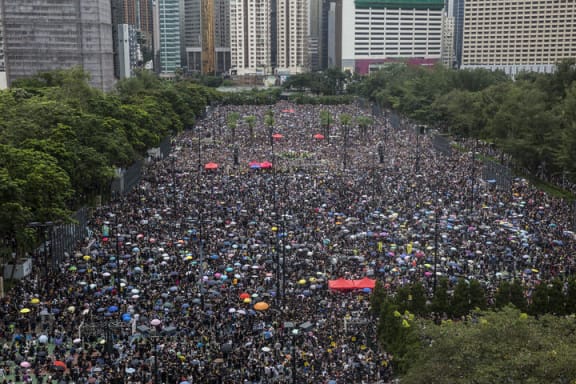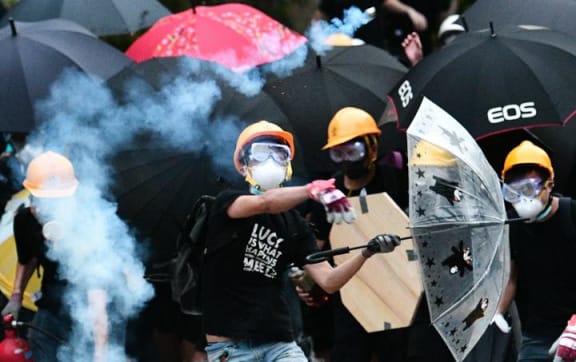In Hong Kong, pro-democracy protests are continuing despite the presence of thousands of Chinese police and military massed just over the border in Shenzhen. Hong Kong has been under Chinese rule since 1997, as part of the “one country – two systems” agreement worked out when Britain handed its former colony back to China.
In today’s visit to the Sound Archives of Ngā Taonga Sound & Vision, we look back at the lead-up to the 1997 handover.
By the 1980s, Hong Kong was the last colony of the British Empire. Britain had held a lease on the land there which was due to expire, so Britain and China finally reached an agreement on how 150-odd years of British rule would come to an end in 1997.
Everyone seemed fairly optimistic about the so-called “one country -two systems” arrangement, as RNZ’s London correspondent Keith Chalkley reported from London for RNZ back in 1984.
“Britain and China initialled a draft agreement on the handover of Hong Kong to the Chinese in 1997. The governer-general of Hong Kong, Sir Edward Youde, has told the people that they could expect a good future when they were handed over to the Chinese in 13 years’ time,” Chalkley reports.
“I can say without hesitation that the agreement provides a sound basis on which the community in Hong Kong can build its future, because it provides the continuation of those elements which the community of Hong Kong have made clear they regard as essential,” Sir Edward says.
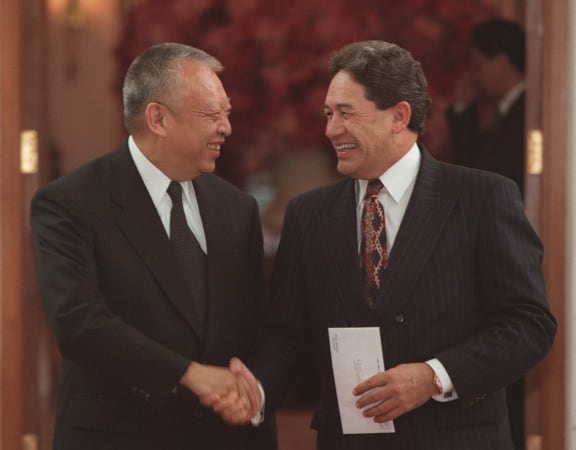
Hong Kong Chief Executive Tung Chee-hwa, left, and former New Zealand Treasurer Winston Peters shake hands during their meeting at the Government House in Hong Kong, a day after the handover on 2 July 1997. Photo: David Brauchli / AFP
“And Britain’s foreign secretary Sir Geoffrey Howe, currently in New York for talks with the United Nations, says that the two years of hard bargain have produced an agreement which would allow Hong Kong to maintain its unique role as a major trading and financial centre,” Chalkley reports.
“The kind of democracy, the kind of government, the kind of administration, the kind of legal system, that will prevail in Hong Kong is essentially that which is there already. The most imaginative input into these negotiations was the phrase produced by chairman Deng Xiaoping – One country, two systems. It’s a huge Communist country, the largest communist country in this world, that they recognise the importance of keeping Hong Kong as is, because Hong Kong as is has made Hong Kong what it is,” Sir Geoffrey says.
“Under the agreement, Hong Kong would retain a free press, its financial institutions and customs. The Chinese have agreed that the existing way of life in Hong Kong will be guaranteed for at least the next 50 years. Sir Peter Blaker, the chairman of the Conservative Party’s foreign affairs committee at Westminster said he was sure the Chinese would keep their side of the bargain as he said, they couldn’t afford not to,” Chalkley reports.
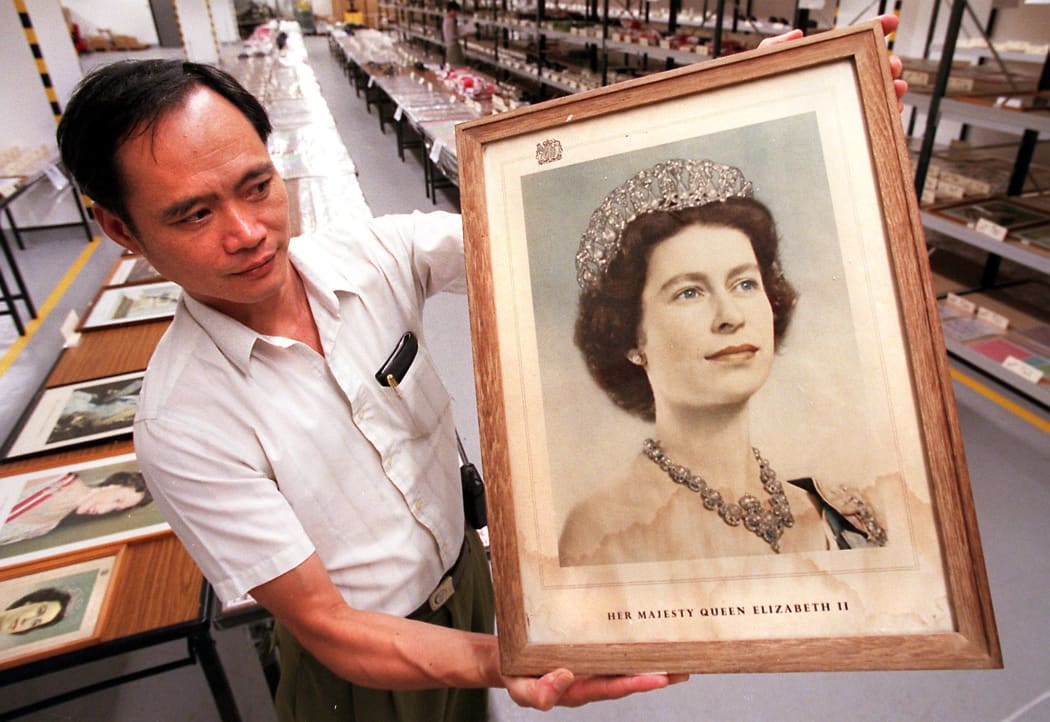
Senior Supplies Supervisor Lin Pong-yin holds up a stained portrait of Queen Elizabeth II 17 October, which was among nearly 10,000 items bearing connotations of British sovereignty that were to be auctioned to the public. Photo: Stephen Shaver / AFP
However, the prospect of a return to Chinese rule was still concerning for many Hong Kong residents. By 1987 Morning Report reported that some were coming to Auckland to check out the property market ahead of moving here as business migrants.
Auckland reporter Henry Grant followed with his report: “Under the government’s business immigration legislation, Hong Kong people are eligible to move to New Zealand if they the requisite financial backing, upwards of $150,000, and can show they possess business acumen. It seems many are looking at buying on Auckland’s North Shore and in inner-city areas like Epsom and Mount Eden. Estate agents say they’re giving extra buying support to an already buoyant market. Some real estate companies have invested thousands of dollars sending agents to Hong Kong to give seminars on the New Zealand property scene.”
“We had one of our fellows who was invited up there by the motel association and he went up there and spoke to a group of investors who were planning to come down here and invest. As it turned out they were more interested in houses than they were in motel investments initially, whilst they’ll probably go in looking at motels and other business ventures later,” one real estate regional manager says.
“Several real estate agencies are involved in giving busloads of Chinese families guided tours around Auckland’s high spots, and it’s not easy to put a figure on how many are coming. But the estimates are all in the hundreds with a significant number signing up, and for a new line of business that only started this year, it seems to have caught on. Real estate officials say demand is likely to keep fairly strong, because many Chinese want to leave Hong Kong when the colony is handed back to China,” Grant reports.
In early 1989, the student-led pro-democracy movement in China encouraged Hong Kong residents that the transition to Chinese rule might not be so bad. But when there was a bloody crackdown in June that year, with the killing of protestors in Tiananmen Square, the impact on Hong Kong was profound.
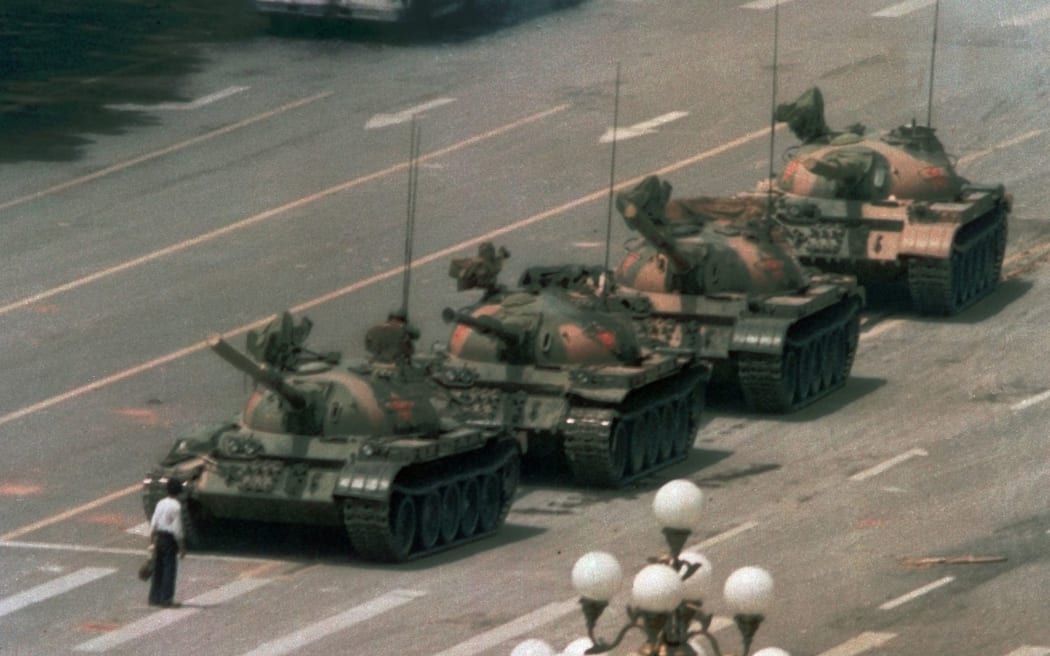
A Chinese man stands alone to block a line of tanks heading east on Beijing's Changan Blvd, in Tiananmen Square in 1989. Photo: AP
There was something of a massed exodus, leading to a brain drain as hundreds of thousands sought to emigrate to Canada, the US and Australia.
Here’s an excerpt from Insight by Kevin McQuillan from October 1989:
“New Zealand High Commissioner Nick Bridge estimates that by the time of the handover in 1997 some 15,000 will have emigrated to New Zealand. While most Hong Kong [people] would prefer to say they say their distrust of the Beijing government is more overwhelming than their love of Hong Kong. Mark, Anita and Phillip are advertising executives in their late 20s.
“What I really want is the foreign passport as a security … The problem is like my situation, it’s very hard to start all over again in another country, because I have established my career in Hong Kong and I really like Hong Kong,” Mark says.
“I think even if Britain gives me a passport, I’ll stay in Hong Kong until there’s really a crisis that I have to go … I think every Hong Kong [resident] would like to stay in Hong Kong because this is the place, where we were born and grew up and educated. This is the place where there’s a lot of chances for us Chinese,” Anita says.
“Do you trust the Beijing government at the moment?” McQuillan asks.
“Not at all,” she says.
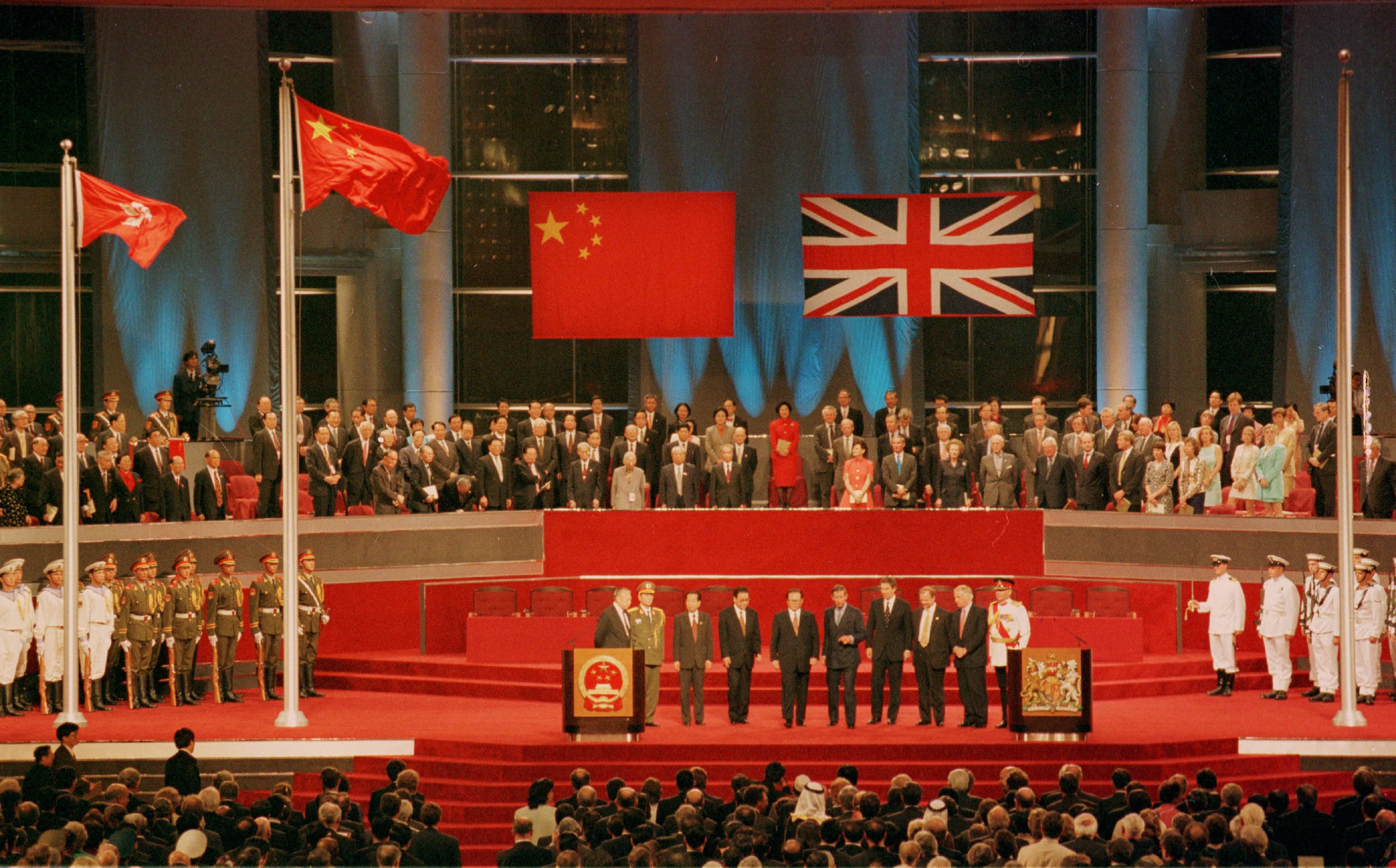
Chinese and British leaders attend the Hong Kong handover ceremony held on 1 July, 1997. Photo: AFP
One year out from the handover, concerns continued. As law changes started to be foreshadowed, Hong Kong politician Libby Wong (who now lives in Australia) expressed her fears to Insight producer Jo Andrews.
“If the basic law is mucked about even today, before 1997, if everything is turned upside down because someone wants to make a statement to Hong Kong people then what future is there for any of us? Then easiest thing is to kowtow. Then you are terrified, then you kowtow in the hope you’ll be safe, in the hope the crocodile will not eat you or will eat you last. We’re into that kind of desperate situation,” Wong says.
“Unless you [stand up for yourself] then the voice will not be heard, and they assume that the silent majority is one of consent. I think that’s one very, very important point. So it is really a question of speaking out and doing your best at this time and there’s still hope.”
“But outside the purely political arena, life in Hong Kong in its backstreets, its banks and in the realms of tiny high-rise flats goes on just the same. Even so, there’s slowly spreading awareness amongst ordinary people that things may not be the same next year,” Andrews reports.
“That the Hong Kong’s easy way of life where the British ran the territory’s institutions and everyone else got on with making money is coming to an end. Next year, those institutions are handed over to China and Hong Kong District Court Judges Richard Hawkes, who is a New Zealander, will be working for a Communist State.”
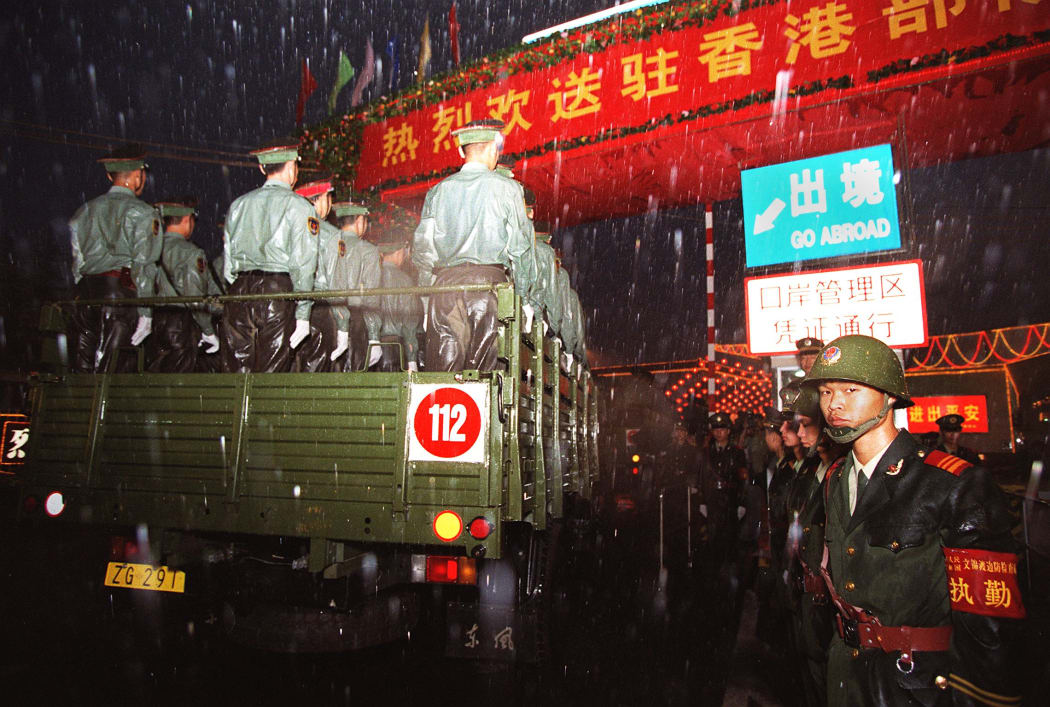
Some 4000 People's Liberation Army troops began pouring into Hong Kong at dawn in the first hours after the territory returned to Chinese rule. Photo: Manuel Ceneta / AFP
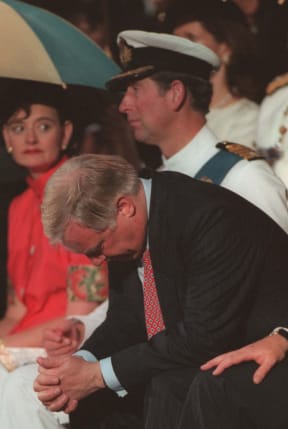
Outgoing Governor of Hong Kong Chris Patten, sitting next to Prince Charles, hangs his head in sadness, after delivering his farewell speech at HMS Tamar in Hong Kong 30 June, 1997. Photo: Mike Fiala / Pool / AFP
“I think general worries might be that Hong Kong might not have the high degree of autonomy that has been promised and that there might be interference from Communist China or officials, some people have perhaps worried that there might be a gradual erosion in law and order, perhaps more corruption, more nepotism, perhaps [in] business it’ll be more of who your contacts are,” Hawkes says.
“Last British Governor of Hong Kong, Chris Patten, hopes that despite all his battles with Beijing, the Chinese will get it right,” Andrews reports.
“What should help them to avoid getting it hopelessly wrong are the people of Hong Kong, who are incredibly resilient. This is a refugee community, two-thirds maybe three quarters of the people here are themselves refugees from events in China or the family of refugees from events in China,” Patten says.
“They’ve endured a tremendous amount over the years, and they’ve built this very rich, very decent city on the foothills of volcanic events to the north and then I’m sure that having coped with the problems of the last few years, they’ll manage ’97 and take it in their stride.”

Photo: Ngā Taonga Sound & Vision
